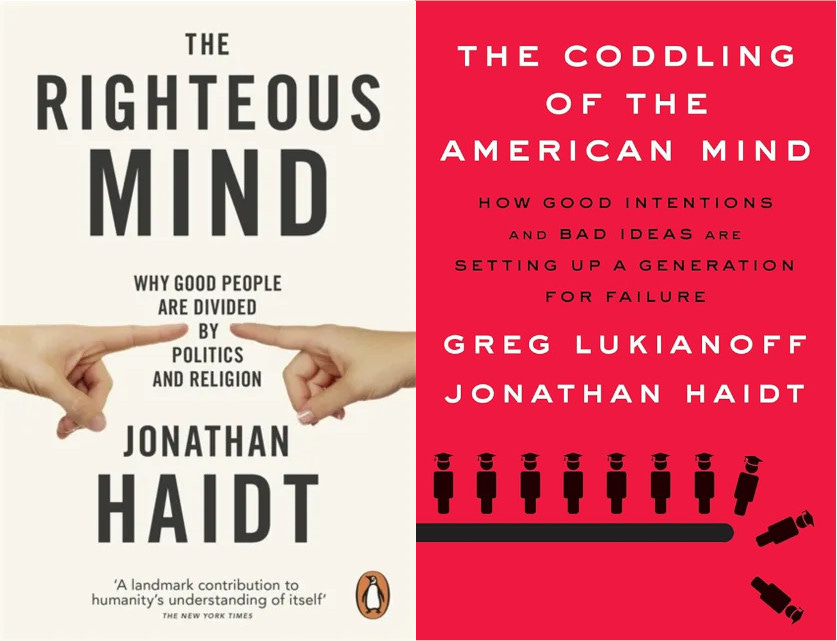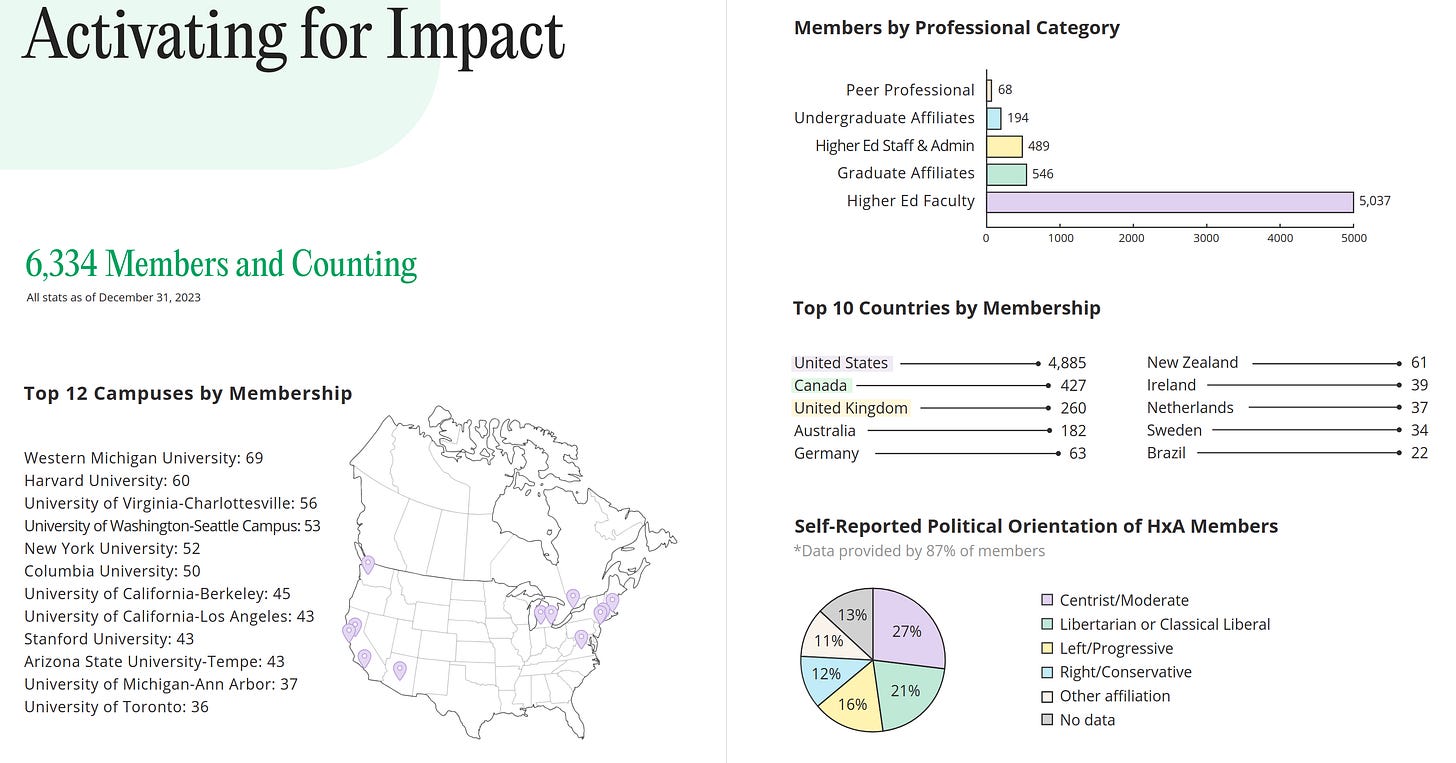Heterodox Academy's big payday
>500k starting
Everybody knows academia has severe political bias issues. Some people have been trying to do something about it for decades. The main academic organization that has been talking up the need for diversity of thought is the Heterodox Academy. It rose due to its superstar founder Jon Haidt. Haidt has written books on these issues:
Given his background, Haidt is a kind of perfect candidate for running this kind of thing. And he did it well for some time. But eventually, he grow tired of it, and put some other people in charge. At least, that's what I guess happened. Since then, Heterodox Academy has been pretty milquetoast. They did issue a statement in defense of Amy Wax's academic freedom, but not in favor of Bryan Pesta's. HxA runs a Youtube channel with some success, it has ~18k subscribers (my dormant Youtube channel has 4k). It has a blog, and their annual report from 2023 says:
57 posts and 130k views. I mean, this is not nothing. However, I am one person writing this blog, and I write about 100 posts a year (and for the last 10 years). This Substack has 2M+ views since 2021, and the Wordpress has 3.8M+ views (I didn't track the stats for all years).
HxA has sponsored some good people and their work, based on my skimming of their website:
David Rozado, who does LLM-based work on e.g. Wikipedia bias and media mentions of woke terms
Cory Clark and colleagues paper "Prosocial motives underlie scientific censorship by scientists: A perspective and research agenda" was important
Musa al-Gharbi on woke questions, who also has a new book out
Aside from these, they are building a grassroots movement of sorts:
It looks impressive, but I think these are mostly passive members. Not useless, but not too exciting either. It means people who at some point went to their website and said "yeah, I'm kinda in favor of thinking outside the box a bit". That is, those who were accepted. If you were actually heterodox in a significant sense, then there's a good chance they rejected you, or you weren't eligible to begin with (only academics can apply, so if you get fired as an academic for heterodoxy...). Nathan Cofnas mentions a rejected case in his anti-HxA piece from 2022 (Four Reasons Why Heterodox Academy Failed):
Seven years later, you can count HxA’s accomplishments in promoting heterodoxy on the fingers of zero hands. It has focused mainly on aggrandizing celebrity academics who hold conventional leftist views, and giving a platform to liberals to engage in empty virtue signaling about their alleged commitment to free inquiry. Scholars whose work is genuinely heterodox have been systematically marginalized. In at least one instance, a psychologist known for his work on race differences (Helmuth Nyborg) was denied membership.
HxA CEO John Tomasi defended it on their blog (A Letter to Our Members and Supporters: Responding to Accusations Against HxA):
Cofnas’ critique additionally implies that HxA denied membership to a scholar in 2017 based on their topic of scholarly inquiry. This is incorrect. HxA denied membership to a scholar in 2017 based on the membership criteria in place at the time that stated applicants “must have no association with racist or other hate groups.” That year an applicant was deemed to be associated with such a group, and on that basis—not because of the topic of their research—they were denied membership.
No details are given. It's amusing HxA is scared of being associated with an actual heterodox person. Maybe he's dangerous? Helmuth is almost 90 years old, and has a very heterodox life history. Leaving home at 13, starting a photography business, becoming a sailor, then a radio officer, then an Olympic medalist in kayaking (in 1960!), then going back to school to become a psychologist, then studying rare genetic disorders related to hormones (e.g. Turner's syndrome), eventually getting into behavioral genetics, intelligence, and race. And that's where the party ended for HxA. HxA is a club for people who are heterodox about things that aren't dangerous to be heterodox about. Kinda like having a strong opinion on ice cream flavors, or the best music genre. Maybe they should be more upfront about this limitation to their heterodoxy.
Still, I didn't want to attack the HxA. They seemed net positive to me. Maybe they don't push hard enough given their academic standing, but at least they push in the right direction. That is, until yesterday when for fun I decided to browse their annual tax filings. HxA is a US non-profit, so it must publish yearly financial reports (with some delay). These show who's getting paid what. This stuff can be interesting because non-profit frequently end up as grift or fraud organizations. They raise money based on mostly empty words (fighting poverty, ending racism, promoting women in science etc.), and then some officers of the organization pocket most of the money. We saw many cases of this playbook during the Black Lives Matters craze (examples 1, 2, 3). How is the HxA doing financially? Well, it has been growing decently well:
I can't see where the money comes from. AI tells me some is from Arthur Vining Davis Foundations, based on HxA's own post about this. No numbers are mentioned.
In the last year of data, 2023, it raised about 3M USD. Who did the money go to?
So CEO John Tomasi netted an impressive 502,071 USD. The total expenses for that year was 2,395,669, so Tomasi netted an impressive 21% of all the revenue. Granted, this is the largest of all years so far. The other years' salaries were also good:
2022:
176,103 USD for Manon Loustaunau (Interim Executive Director (Outgoing))
87,098 USD for John Tomasi (Chief Executive Office)
2021:
232,674 USD for Debra Mashek (Former Executive Director)
151,030 USD for Manon Loustaunau (Interim Executive Director)
2020:
266,992 USD for Debra Mashek (Outgoing Executive Director)
There were other more normal salaries for other staff as well, but these 3 people certainly are getting their part.
One wonder if this money could not have been used more wisely in order to actually promote heterodox science and viewpoints, or anything really. On the other hand, if someone would like to hire me to run a small non-profit for 500k/year salary, please get in contact!







I don't know anything about HA in particular, but:
- I think judging an organization like this by blog posts is the wrong metric. They are much more likely to be doing conferences, networking, surveys, events, etc. If you look at their impact claims ( https://heterodoxacademy.org/impact/ ) it doesn't even mention the blog, and I figure having a blog at all was an afterthought for them.
- I don't think it's beyond the pale for them to choose to reject people who are *too* heterodox. I think the extremely-heterodox people should have spaces and organizations representing them, but that it's also good to have an organization which pushes for change but is still normie enough that they can keep some level of influence and get taken seriously.
- Maybe I've spent too much time in Silicon Valley but it doesn't seem crazy for the CEO of one of the leading nonprofits promoting academic freedom to get paid as much as a mid-level Facebook manager. In general I'm skeptical of arguments for paying people less because that's how you get worse people. John Tomasi seems to have formerly been a tenured Ivy League professor, I assume those people don't come cheap. Yes, if you cut the salary by 75% you could replace him with a random guy with a marketing degree, but I don't think it's obvious that that's a better deal. I agree that at $400K+ somebody should be writing a justification of this somewhere, but I don't think it's impossible for such a justification to exist, and I would expect Haidt to have enough sense not to give his project to a grifter.
Next time I have 500k to dedicate to heterodox science, it’s going to Emil.